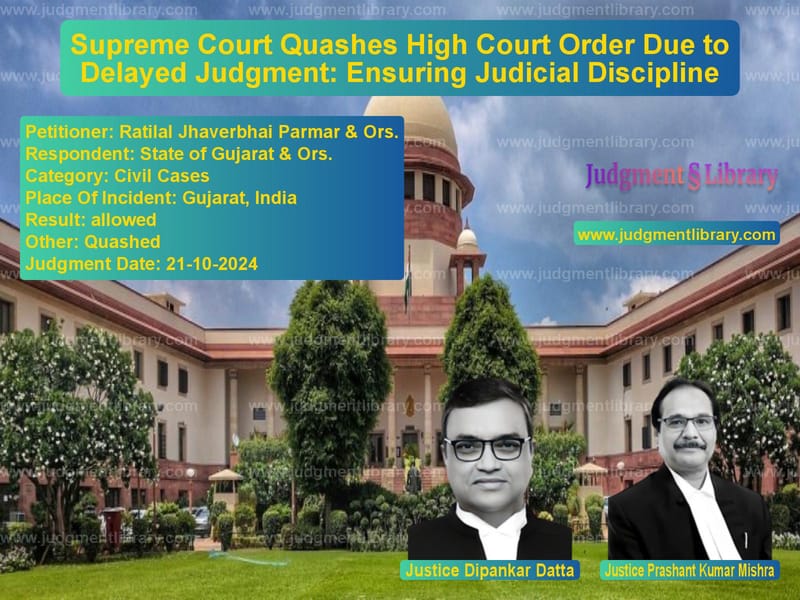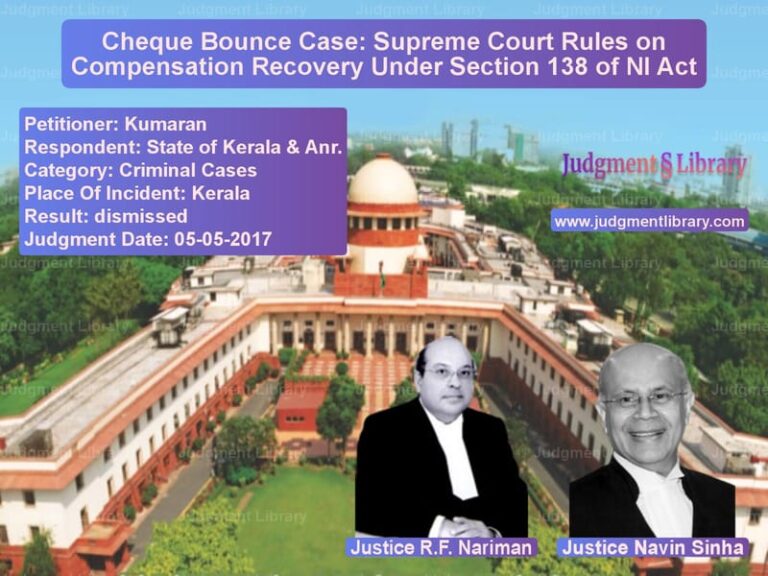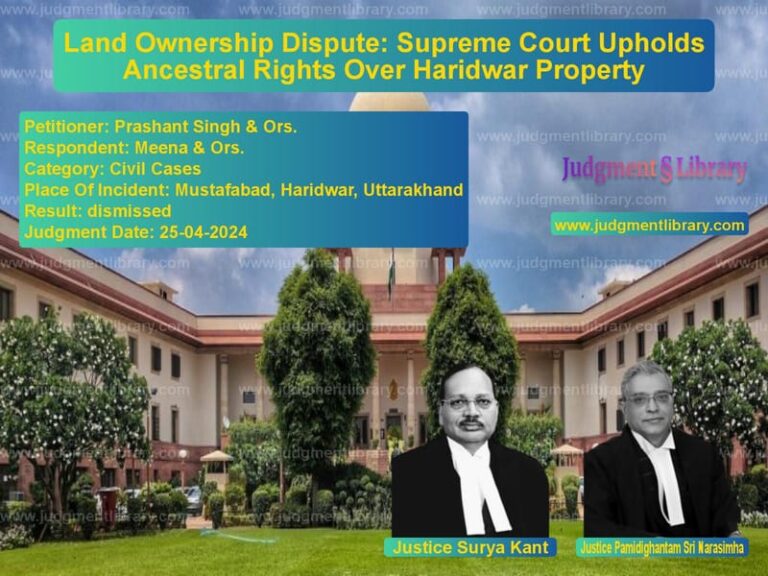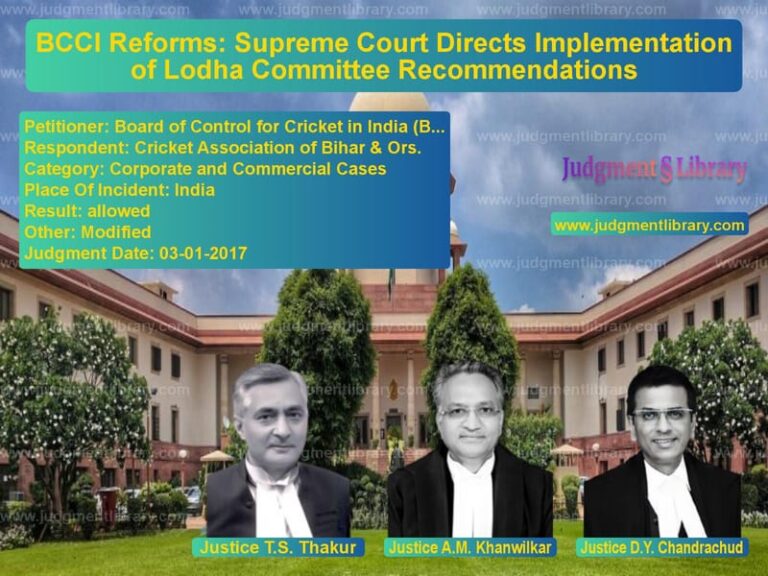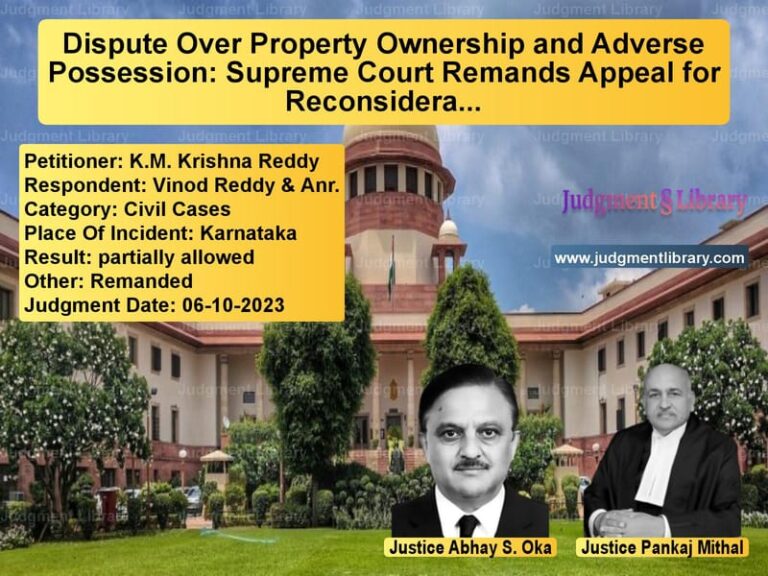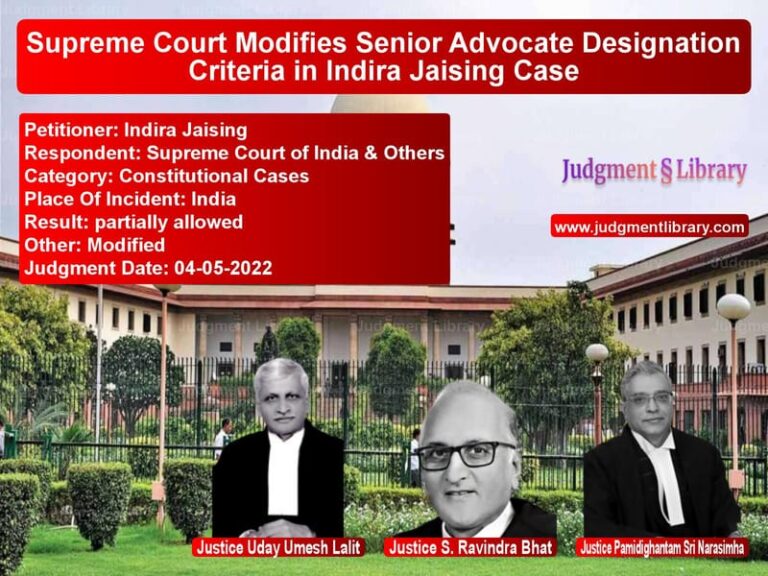Supreme Court Quashes High Court Order Due to Delayed Judgment: Ensuring Judicial Discipline
The Supreme Court of India, in Ratilal Jhaverbhai Parmar & Ors. v. State of Gujarat & Ors., delivered a landmark ruling on October 21, 2024, quashing a Gujarat High Court order due to an egregious delay in providing the reasoned judgment. The Court held that issuing a judgment over a year after orally dismissing the case in open court violated fundamental principles of justice and judicial discipline. This case underscores the necessity of timely pronouncements in the judicial process.
Background of the Case
The case arose from a petition filed under Article 227 of the Constitution of India before the Gujarat High Court, challenging an order passed by the Deputy Collector, Kamrej Prant, District Surat. The High Court heard the matter on March 1, 2023, where the learned judge orally pronounced, “I will dismiss”, and then stated, “dismissed”. However, no written judgment was made available to the petitioner for over a year.
Legal Irregularity
- The appellant’s counsel did not receive any certified copy of the judgment, as no detailed reasoning was provided on record.
- On April 30, 2024, the appellant received a soft copy of the reasoned judgment from the IT Cell of the High Court, dated March 1, 2023, but dictated only on April 12, 2024.
- The Supreme Court found this conduct highly irregular and against judicial norms.
Petitioner’s Arguments (Ratilal Jhaverbhai Parmar & Ors.)
The petitioner, represented by legal counsel, contended:
- The Gujarat High Court judge had ante-dated the judgment to create a false impression that the ruling was made on March 1, 2023.
- The undue delay in issuing a reasoned order denied the appellant an opportunity for further judicial recourse.
- The delay constituted a violation of Article 21 of the Constitution, as held in previous rulings, including Anil Rai v. State of Bihar.
- The judge, after dismissing the petition in open court, had lost jurisdiction over the case and could not provide reasoning after a year.
Respondent’s Arguments (State of Gujarat & Ors.)
The respondents countered:
- The dismissal order was pronounced in open court, and counsel for the petitioner was present.
- The High Court was within its discretion to provide the reasoning later.
- The appellant was not prejudiced as the case outcome remained unchanged.
Supreme Court’s Analysis and Judgment
Delay in Reasoning Violates Judicial Discipline
The Supreme Court held that the High Court’s conduct violated fundamental judicial principles:
“The delay in providing a reasoned judgment for over a year after orally dismissing the case is unacceptable. The judiciary must function with promptness and efficiency to uphold the rule of law.”
Judicial Precedents Ignored
The Court referenced Balaji Baliram Mupade v. State of Maharashtra, emphasizing:
“When a judgment is pronounced in open court, it must be followed by a written reasoning within a reasonable time. The failure to do so deprives an aggrieved party of judicial redress.”
High Court Judge Lost Jurisdiction
The Supreme Court observed:
“Once the judge dismissed the petition in open court without reserving the judgment, the court became functus officio. Writing a reasoned order a year later was impermissible.”
Quashing of High Court Judgment
The Court ruled:
“The High Court judgment is set aside, and the petition is restored for fresh adjudication before another bench.”
Key Takeaways from the Judgment
- Timely Judgments are Essential: Courts must provide reasoned orders promptly after oral pronouncements.
- Loss of Jurisdiction: A judge cannot retrospectively issue a reasoned judgment after announcing a ruling in open court.
- Judicial Accountability: The ruling reinforces the need for judicial officers to follow established protocols.
Impact of the Judgment
- Prevents Future Judicial Delays: The decision sets a precedent discouraging undue delays in providing written judgments.
- Enhances Transparency: Ensures that litigants receive timely and fair judicial decisions.
- Restores Public Faith in Judiciary: Reinforces that courts must adhere to procedural integrity.
Conclusion
The Supreme Court’s ruling in Ratilal Jhaverbhai Parmar v. State of Gujarat sends a strong message against delayed judgments and improper judicial conduct. By quashing the High Court order, the ruling reaffirms the necessity of timely, reasoned judgments and judicial accountability. This case will serve as a guiding precedent for courts across India to maintain discipline and transparency in their functioning.
Petitioner Name: Ratilal Jhaverbhai Parmar & Ors..Respondent Name: State of Gujarat & Ors..Judgment By: Justice Dipankar Datta, Justice Prashant Kumar Mishra.Place Of Incident: Gujarat, India.Judgment Date: 21-10-2024.
Don’t miss out on the full details! Download the complete judgment in PDF format below and gain valuable insights instantly!
Download Judgment: ratilal-jhaverbhai-p-vs-state-of-gujarat-&-o-supreme-court-of-india-judgment-dated-21-10-2024.pdf
Directly Download Judgment: Directly download this Judgment
See all petitions in Contempt Of Court cases
See all petitions in Constitution Interpretation
See all petitions in Public Interest Litigation
See all petitions in Legal Malpractice
See all petitions in Other Cases
See all petitions in Judgment by Dipankar Datta
See all petitions in Judgment by Prashant Kumar Mishra
See all petitions in allowed
See all petitions in Quashed
See all petitions in supreme court of India judgments October 2024
See all petitions in 2024 judgments
See all posts in Civil Cases Category
See all allowed petitions in Civil Cases Category
See all Dismissed petitions in Civil Cases Category
See all partially allowed petitions in Civil Cases Category

